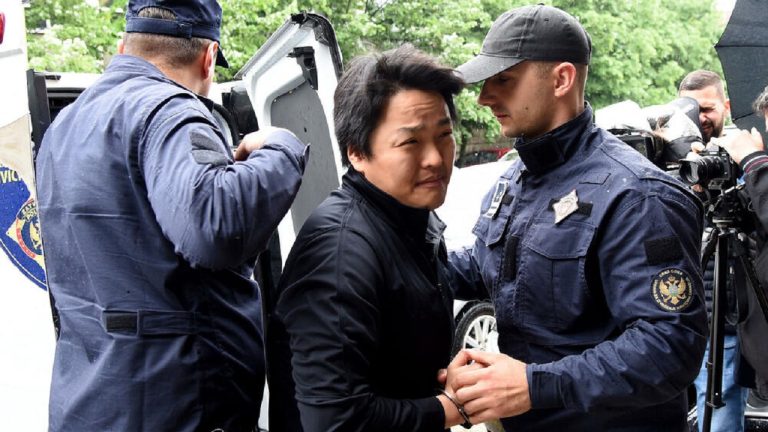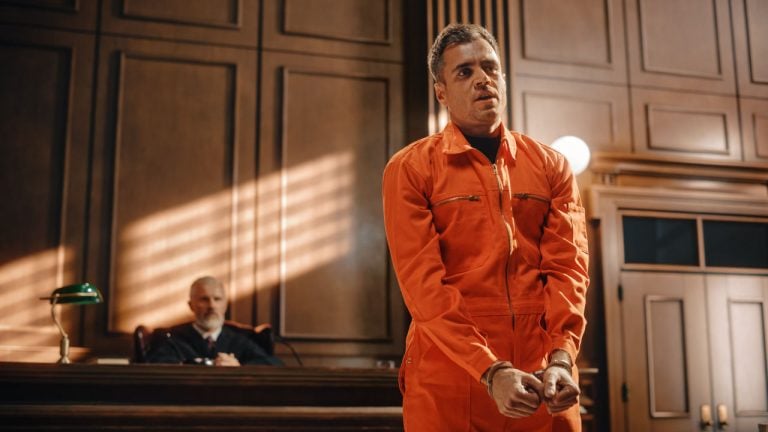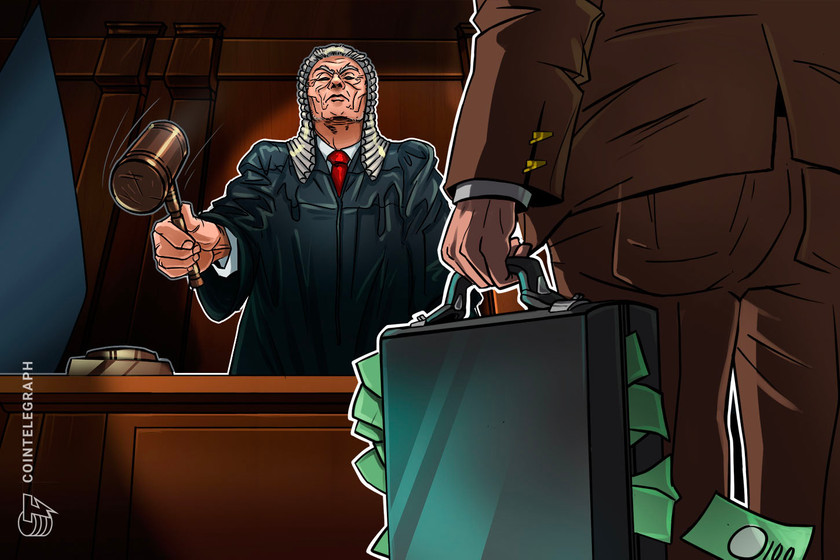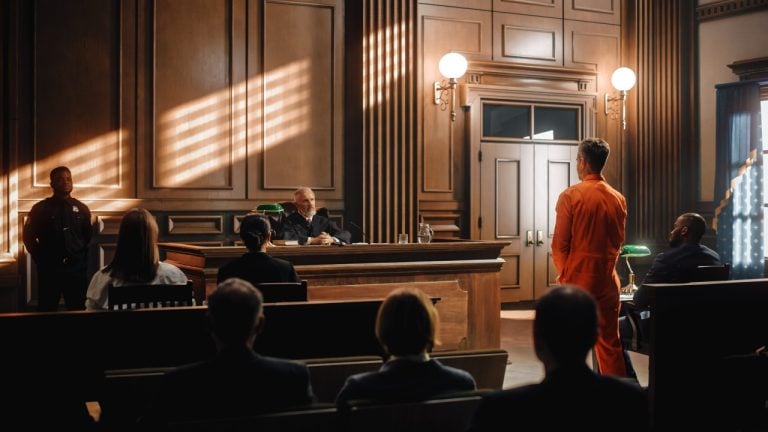 Terraform founder Do Kwon will be released from jail but placed under police surveillance at a local residence, a Montenegrin court has decided. The trial against him and another Korean, on charges of travelling on false documents, opened on Thursday with both pleading not guilty. Court Grants Bail Request for Do Kwon, Puts Him Under […]
Terraform founder Do Kwon will be released from jail but placed under police surveillance at a local residence, a Montenegrin court has decided. The trial against him and another Korean, on charges of travelling on false documents, opened on Thursday with both pleading not guilty. Court Grants Bail Request for Do Kwon, Puts Him Under […] The founder of crypto exchange Bitzlato, who is facing a money laundering case in the U.S., is seeking support from members of the community. Anatoly Legkodymov was arrested in January for his role in the trading platform which allegedly processed millions of dollars’ worth of illicit funds. Bitzlato Founder Looking for Bail Guarantors in U.S. […]
The founder of crypto exchange Bitzlato, who is facing a money laundering case in the U.S., is seeking support from members of the community. Anatoly Legkodymov was arrested in January for his role in the trading platform which allegedly processed millions of dollars’ worth of illicit funds. Bitzlato Founder Looking for Bail Guarantors in U.S. […]
The judge said that imprisonment wasn’t necessary because Jatinder Singh couldn’t flee Australia without his Indian passport.
The Crypto.com customer who was accidentally sent $6.95 million from the exchange in 2021 and then allegedly went on a spending spree has been granted bail in Australia despite $2 million funds still unaccounted for.
In the Victorian County Court, prosecutors on March 20 tried to convince the judge that imprisonment would be the only way to ensure that Jatinder Singh would not flee the country.
The blunder by Crypto.com came about when a Bulgarian-based employee accidentally transferred $6.95 million to his account instead of what was meant to be a $100 refund in May 2021. The Melbourne man is alleged to have bought four houses and a car with the funds, along with sending a portion overseas.
Prosecutors argued that Singh is financially motivated to flee the country because only $4.9 million has been recovered, according to a report from the Herald Sun.

Of the missing $2 million, over $1.45 million is believed to have been shifted offshore to Malaysia, the court heard.
Senior Constable Conor Healy told the judge that Singh “may have access to the outstanding money that has not been recovered yet,” while prosecutor Peter Botros argued that Singh posed an “unacceptable” flight risk because he was living without a visa, had no family in Australia and was unemployed prior to his arrest.
However, Judge Daniel Holding didn’t think this was enough to put Singh behind bars. He instead explained that confiscating Singh’s Indian passport and preventing him from applying for a new one at the Indian Embassy would be sufficient:
“If there is a condition that he not have a passport or he not apply for a passport … how does he manage to flee the country?”
Singh is facing a series of theft charges alongside his partner, Thevamanogari Manivel, who is the owner of the bank account to which the funds were transferred.
Both pleaded not guilty to the charges. They continue to claim that they rightfully won the $7 million through a Crypto.com contest.
Related: Failed exit? Traders complain Crypto.com reversed profitable LUNA transactions
While the incident occured in May 2021, it was not discovered until an annual audit in December 2021.
The Singaporean-based cryptocurrency exchange has since launched civil action in the Victorian Supreme Court to recover the losses.
The Victoria Supreme Court h ruled that the funds must be returned to the company.

The judge overseeing Sam Bankman-Fried’s fraud case wants some help navigating the world of encrypted messaging, privacy apps, and virtual private networks.
Attorneys working on behalf of former FTX CEO Sam Bankman-Fried have agreed to pay for a security expert to assist the federal judge overseeing his fraud case in navigating modern encryption technology to aid in possibly modifying Bankman-Fried's bail terms.
Bankman-Fried lawyers Christian Everdell and Mark Cohen sent a letter to Judge Lewis Kaplan on Feb. 21 agreeing with his proposal for a technical professional to aid him.
According to the letter, “the defense has already begun researching and contacting possible experts and anticipates being able to propose one or more potential candidates to the court by the end of the week.”
NEW: Just filed today, the defense expects to propose one or more potential candidates to act as an independent technical expert to advise the court on @SBF_FTX's bail conditions by the end of the week. pic.twitter.com/WfkF5frBAn
— Eleanor Terrett (@EleanorTerrett) February 21, 2023
Judge Kaplan suggested at a bail hearing last week following a tightening of bail terms when it was discovered that Bankman-Fried had been accessing the internet using a VPN (virtual private network).
A VPN obscures and encrypts a user’s internet traffic and is often used to change internet (IP) addresses, to add a layer of security to communications or to access censored content in autocratic regimes.
The judge has been trying to achieve a balance between letting Bankman-Fried access communication channels to prepare his defense and the potential misuse of messaging apps and privacy software.
Judge Kaplan temporarily banned Bankman-Fried from using a VPN or any encrypted messaging apps until his bail terms are settled.
Related: Sam Bankman-Fried may no longer be allowed to play League of Legends
The technical expert will help the judge navigate issues regarding encrypted messages, privacy-focused messaging apps and VPNs.
Bankman-Fried and his attorneys claim he used the VPN on two occasions, to watch the NFL playoffs on Jan. 29 and to watch the Super Bowl on Feb. 12.
Prosecutors have asked for strict bail terms limiting Bankman-Fried’s access to the internet and messaging platforms. They also alleged that VPN use “raised several potential concerns” regarding thepotential access of crypto platforms that have blocked United States users.

A federal judge said there was "probable cause" to believe that SBF engaged in activities that could land him in jail.
Former FTX CEO Sam Bankman-Fried could “conceivably” have his bail revoked after a federal judge said there was “probable cause” to believe he may have engaged in attempted witness tampering.
In the Feb. 16 hearing on Bankman-Fried’s bail conditions, Judge Lewis Kaplan said there was “probable cause to believe that he [Bankman-Fried] has committed or attempted to commit a federal felony while on release, namely witness tampering” according to multiple reports.
Kaplan suggested that this could “conceivably” see the FTX founder sent back to jail until his trial date in October.
Kaplan noted however that the Feb. 16 hearing was not a bail revocation hearing, but added that it “could get there, conceivably.”
"Why am I being asked to turn him loose in this garden of electronic devices?” Kaplan reportedly said.
Law Professor Richard Painter echoed the sentiment in a Feb. 17 tweet, suggesting that witness tampering might not be a good idea given his current circumstances:
“Hey Crypto Bro: Witness tampering while out on bail is a great way to go right back to jail.”
On Feb. 15, prosecutors asked Judge Kaplan to further restrict Bankman-Fried’s device usage to a single monitored computer and cellphone in a letter.
Prosecutors had pointed to Bankman-Fried’s recent device usage as cause for concern, seeking to further restrict and monitor his usage “with limited exceptions.”
During the hearing, Judge Kaplan suggested that it was naive to believe that these restrictions would stop him from using the internet, given that Bankman-Fried is living with his two parents, who both have laptops and cellphones.
Prosecutor Nicholas Roos seemingly agreed, suggesting there may not be a “great solution,” which prompted Kaplan to imply that revoking Bankman-Fried’s bail could eliminate these risks, noting:
“There is a solution, but it’s not one anybody has proposed yet.”
Bankman-Fried’s lawyers however argued that they need him to be able to work on his defense, claiming: “We cannot go through these extensive financial records without him.”
Related: Judge allows release of identities of guarantors behind Sam Bankman-Fried’s bail
The former FTX CEO has been prohibited from using certain messaging apps as of Feb. 9 after he was found to have contacted potential witnesses. He was also temporarily banned from using a VPN after prosecutors accused him of using it on two occasions on Jan. 29 and Feb. 12.
The VPN ban was not extended in the Feb. 16 hearing.
Many from the crypto community have expressed disbelief that Bankman-Fried is yet to have his bail revoked under the circumstances.
Yes, why? What exactly does @SBF_FTX have on the prosecution that they’re not demanding his bail be immediately revoked? Or do they think he can take down @binance if he flips? Is he waving that at them? Because none of this makes sense otherwise. https://t.co/l66Qls0d46
— Alex Berenson (@AlexBerenson) February 16, 2023

Sam Bankman-Fried is, for the most part, still able to freely access the internet through various devices. Prosecutors want to change that.
Sam Bankman-Fried, the former CEO of crypto exchange FTX, may no longer be able to play League of Legends and other video games if newly proposed changes to his bail conditions from United States prosecutors are approved.
In a Feb. 15 letter to United States District Judge Lewis Kaplan, U.S. Attorney Damian Williams asked the court to further expand restrictions surrounding Bankman-Fried’s electronic device usage.
They pointed to Bankman-Fried’s recent device usage as cause for concern, and agreed with the court’s intuition that it was “shortsighted” to focus only on restricting the use of apps, adding:
“There is now a record before the Court of a defendant who appears motivated to circumvent monitoring and find loopholes in existing bail conditions. The appropriate course, therefore, is broader restrictions on the defendant’s cellphone, tablet, computer, and internet usage, with limited exceptions.”
The prosecutors propose that Bankman-Fried should be prohibited from using cellphones, tablets, computers, or the internet, except for very limited uses such as reviewing pre-trial evidence, communicating with lawyers and accessing emails.
Here’s the list of proposed new bail restrictions that SBF is going completely ignore, without any real consequences https://t.co/cMVCdmRAj3
— Sean Tuffy (@SMTuffy) February 15, 2023
He would be restricted to using a single computer and cell phone, which in addition to his Gmail account would be monitored using a “pen register” — a device or process that essentially produces a list of phone numbers of internet addresses contacted from a specific source.
Bankman-Fried is understood to be an avid gamer, having reportedly played online video games such as League of Legends during fundraising rounds while at FTX.
Bankman-Fried also mentioned during an interview with New York Times on Nov. 13 that he likes to play games, as it helps him “unwind a bit” and clear his mind.
Under the newly proposed bail conditions, it appears that Bankman-Fried will no longer be allowed to partake in the activity.
Related: Judge allows release of identities of guarantors behind Sam Bankman-Fried’s bail
Earlier this month, the former CEO was prohibited from using encrypted messaging apps after he was found to have contacted potential witnesses in his criminal case.
He has also been temporarily banned from using VPNs on Feb. 14, after the Justice Department discovered he had used a VPN on two different occasions — in order to watch sports coverage. This ban will be further discussed during a Feb. 16 hearing.
Many from the crypto community were disgusted by the initial conditions of Bankman-Fried’s bail, which required him to wear an ankle bracelet but afforded him full computer and internet access from his parents luxurious home in sunny California.
SBF will be spending Christmas at home with his parents playing video games rather than locked up in a cell. What kind of justice is that?
— Layah Heilpern (@LayahHeilpern) December 23, 2022

Members of Crypto Twitter are speculating whether Bankman-Fried and FTX will source the reported $530 million invested in Anthropic to pay off FTX creditors.
Google Cloud has reportedly invested $300 million into artificial intelligence (AI) startup firm Anthropic, which also happened to receive over $500 million in funds from former FTX CEO Sam Bankman-Fried about six months before FTX catastrophically collapsed.
While the $300 million figure was reported by Financial Times on Feb. 4, Anthropic confirmed the investment partnership with Google Cloud on the same day despite not disclosing any figures:
We're excited to use Google Cloud to train our AI systems, including Claude! https://t.co/IaqQ5lpJrP https://t.co/vOn5Cj4sPt
— Anthropic (@AnthropicAI) February 3, 2023
In the same announcement, Anthropic also confirmed that they previously raised capital from Bankman-Fried and former Alameda Research CEO Caroline Ellison, among others, in its Series B fundraising round:
The Series B round was led by Sam Bankman-Fried, CEO of FTX. The round also included participation from Caroline Ellison, Jim McClave, Nishad Singh, Jaan Tallinn, and the Center for Emerging Risk Research (CERR)."
The fundraising efforts led by Bankman-Fried took place in April, 2022, according to Crunchbase.
A recent post by The New York Times reported that of the $580 million raised, about $530 million came from Bankman-Fried and his former business partners.
But some believe the figure to be even higher too.
One FTX creditor believes Bankman-Fried’s stake in the AI company could be as high as $1.1 billion. However, the creditor didn't elaborate on the figure.
Other members of the Crypto Twitter community are also speculating whether Bankman-Fried’s stake will be used to pay off the massive pile of debt that FTX has accumulated from their recent controversies.
Related: Google AI turns all 10,000 BAYC NFTs into machine-made art
As for the partnership, Anthropic will now utilize Google Cloud’s GPU and TPU clusters to train, expand, and implement its AI chatbox, called “Claude” — similar to that of OpenAI's ChatGTP.
Google Cloud received about a 10% stake in Anthropic, according to Financial Times.
While it remains to be seen where the bulk of the debt in the FTX bankruptcy case will be sourced from, Bankman-Fried personally pleaded not guiltty to all eight fraud and conspiracy-based charges laid against him on Jan. 3.
Bankman-Fried currently remains under house arrest at his parent’s California home until his trial date, which is set for Oct. 2, 2023.

The media’s lawyers argued the public’s right to know Bankman-Fried's sureties outweighed their privacy and safety rights, but Bankman-Fried’s lawyers strongly disagreed.
Eight major media companies including Bloomberg, The Financial Times and Reuters have demanded public disclosure of the two individuals responsible for guaranteeing FTX former CEO Sam Bankman-Fried's $250 million bond.
In a Jan. 12 letter addressed to New York District Court Judge Lewis Kaplan, attorneys from Davis Wright Tremaine LLP — acting on behalf of the media giants — argued that “the public’s right to know Bankman-Fried's guarantors outweighed their privacy and safety rights.”
Media organizations looking to persuade the judge to unseal the identities of Bankman-Fried's guarantors include the Associated Press, Bloomberg, CNBC, Dow Jones, The Financial Times, Insider and the Washington Post.

In making their case, the media’s lawyers used case precedent from Ghislaine Maxwell’s Dec. 2020 case — where the bond guarantors' names weren’t revealed — to argue that Sam Bankman-Fried’s financial crimes were not as serious as Maxwell’s involvement in Jeffery Epstein’s child sex traffic ring scandal:
"While Mr. Bankman-Fried is accused of serious financial crimes, a public association with him does not carry nearly the same stigma as with the Jeffrey Epstein child sex trafficking scandal.”
According to a Jan. 12 report from Reuters, Bankman-Fried’s lawyers previously argued that Bankman-Fried's sureties should be kept under wraps as Joseph Bankman and Barbara Fried — the parents and co-signers of Bankman-Fried’s $250 million bond — have received ongoing physical threats since FTX's catastrophic collapse in early November.
Related: Sam Bankman-Fried: ‘I didn’t steal funds, and I certainly didn’t stash billions away’
If the guarantor’s names were revealed, there would be a “serious cause for concern” for the safety and welfare of those two people, Bankman-Fried’s lawyers argued.
On Jan. 3, Bankman-Fried pleaded not guilty against all eight criminal charges related to the shock collapse of his former cryptocurrency exchange FTX, which includes wire fraud and violations of campaign finance laws among other charges.

Compared to his prison accommodations in The Bahamas, the former billionaire appears to be living a pretty decent life while under house arrest.
Sam Bankman-Fried has reportedly been leading a decent lifestyle while under house arrest in his parent’s home in Palo Alto — with daily jogs, a security detail, and a couple of in-home visits.
However, it's not exactly a life of endless luxury either. The former FTX CEO is reportedly required to wear an ankle monitor and is only allowed to leave the house under certain circumstances, among other restrictions.
The aforementioned Palo Alto home, located on the border of Stanford University’s campus is understood to be a $4 million property equipped with 5 bedrooms, 3 bathrooms, and a pool according to real estate listings.
The property has had to be barricaded on both ends however, as Bankman-Fried has reportedly faced death threats, while his home has turned into something of a tourist attraction for curious onlookers.
His family is shelling out $10,000 a week for a private security firm, according to a Dec. 27 article from the New York Post.

As part of the Dec. 22 bond agreement, Bankman-Fried is required to wear an ankle bracelet, has been forced to surrender his passport and is also required to seek approval for any transactions in excess of $1,000. He is also not allowed to possess a firearm, any other weapon or “destructive device”.
He is only able to leave the property for exercise and for substance abuse treatment and mental health purposes — something he is understood to have taken up — with multiple reports indicating he has been going for daily jogs with his security detail in tow.
Related: Bankman-Fried may enter plea in NY federal court next week before Judge Lewis Kaplan
While this is still a far cry from the Bahamas penthouse he was previously living in, it still appears far better than the conditions of his cell in Fox Hill prison in The Bahamas.
That being said, some in the crypto community have been vocal about Bankman-Fried’s release on bail, particularly considering he was able to do so without any upfront payment.
SBF will be spending Christmas at home with his parents playing video games rather than locked up in a cell. What kind of justice is that?
— Layah Heilpern (@LayahHeilpern) December 23, 2022
Instead, hs parents' property has been put up as security for the record $250 million bond, after Bankman-Fried claimed to only have $100,000 in his bank account following the collapse of FTX.
He’s reportedly already been visited by Michael Lewis, the writer of the popular trading-focused film Big Short who appears to be turning the FTX saga into a movie.
On Dec. 28, cryptocurrency vlogger Tiffany Fong revealed on Twitter she had visited Bankman-Fried in his parent’s home for a "conversation" just the night before.
Fong was one of the first to interview Sam Bankman-Fried after the exchange went bankrupt in November, and the vlogger is expected to write about the meeting after her holiday.
I met with Sam Bankman-Fried last night.
— Tiffany Fong (@TiffanyFong_) December 28, 2022
I haven’t written anything thoughtful out about our conversation - I’m just sharing because I’m getting some questions about this. I’m still in holiday mode & am visiting family in SF atm, so please be patient.
While Bankman-Fried has denied criminal liability numerous times since the collapse of FTX, he is set to appear in a New York federal court on Jan. 3 and is expected to enter a plea agreement to charges of wire fraud and conspiracy.
 The alleged operator of crypto exchange BTC-e, Alexander Vinnik, has asked to be released on bail due to the delay in court proceedings. In early August, the Russian IT specialist was extradited to the United States to face charges of money laundering through the now-defunct coin trading platform. Vinnik’s Defense Appeals for His Release on […]
The alleged operator of crypto exchange BTC-e, Alexander Vinnik, has asked to be released on bail due to the delay in court proceedings. In early August, the Russian IT specialist was extradited to the United States to face charges of money laundering through the now-defunct coin trading platform. Vinnik’s Defense Appeals for His Release on […]